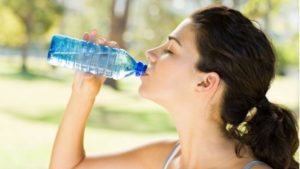Skip to content
I was talking to someone the other day about the water we drink. This person said “If the water goes bad in the city, I will drink bottled water.” That comment made me ask myself, Is bottle water safe to drink? I found the following article on Fox News Health.
It’s frightening to know that we are drinking this poison everyday and our government agencies allow it. The only guaranteed solution to have clean pure drinking water is to filter or distill the water before we drink it. Here is the article written by Dr. Jennifer Landa, Published on January 13, 2014, FoxNews.com.

More than 24,500 chemicals found in bottled water
Bottled water has become a bit of a trend – specific brands with unique shapes that tell the world a little something about you. While your bottle of water might make you appear to be a purveyor of optimal hydration, it is also a red flag that you may be exposing your body to an onslaught of chemicals.
In a recent study by German researchers, nearly 25,000 chemicals were found lurking in a single bottle of water. Many of these chemicals mimic the effects of potent pharmaceuticals inside your body, according to the study published in the journal PLoS One.
The study was broken into two parts. For the initial portion, the researchers tested 18 samples of various commercially sold water bottles from around the globe. Through chemical analyses, they tested the water to determine if it interfered with the body’s estrogen and androgen receptors. Tap water was tested as well, for comparison. The researchers were shocked to learn that most of the bottled waters revealed interference with both kinds of hormone receptors; amounts as little as 0.1 ounces inhibited estrogenic activity by 60 percent and androgenic activity by 90 percent. The tap water, on the other hand, showed no activity on either form of receptor.
During the second part of the study, the scientists sought to pinpoint which chemicals were the cause of reproductive hormonal interferences. Using other forms of detection to isolate the various chemicals, the researchers found more than 24,500 different chemicals in the bottled waters – including two classes of chemicals, maleates and fumarates, which are known potent endocrine disruptors (hormonally active chemicals). Maleates and fumarates are utilized to manufacture plastic resins, which are used to make water bottles, and they may also appear as contaminants of other plastic chemicals.
Despite these alarming results, you don’t have to fear for your life, if you have been toting bottled waters around for years. Good hydration is important, and sometimes, there aren’t other options. As a healthy adult, the occasional sip from the “toxic fountain” of bottled water won’t kill you. However, small children, women of child-bearing age, and pregnant women are at greater risk of poor outcomes when exposed to these chemicals. Effects can include stunted growth, early puberty, premature birth, infertility and early menopause – just to name a few. The remaining population should still exercise caution, as more and more research is discovering that these chemical can also trigger diabetes, heart disease and certain types of cancer.
Instead, make it a habit to carry a refillable water bottle. Many cities and states are beginning to convert water fountains to more easily accommodate refilling your water bottle. This began as an effort to protect the environment, but following this study, it would appear the benefits are dual fold. Earlier this year the FDA banned bisphenol-A (BPA), a common chemical used to make plastic bottles and linings of cans, from some food-related plastics. The ban also included baby bottles and sippy cups, though manufacturers say they had already eliminated the chemical in their products. It would seem, however, BPA isn’t the only problem when it comes to chemicals leaking into the food supply.
Take control of your health. Invest in a reusable water bottle. Choosing bottles made of nontoxic glass or stainless steel are highly recommended to ensure your health and safety. Many manufacturers have begun making glass bottles covered by a rubber cover to prevent breakage and simplify your commitment to health. And, of course there is one more benefit – by choosing to carry a refillable water bottle, you avoid that $2 plus charge every time you’re thirsty.
Dr. Jennifer Landa is Chief Medical Officer of BodyLogicMD, the nation’s largest franchise of physicians specializing in bioidentical hormone therapy. Dr. Jen spent 10 years as a traditional OB-GYN, and then became board-certified in regenerative medicine, with an emphasis on bio-identical hormones, preventative medicine and nutrition. She is the author of “The Sex Drive Solution for Women.” Learn more about her programs at www.jenlandamd.com.
